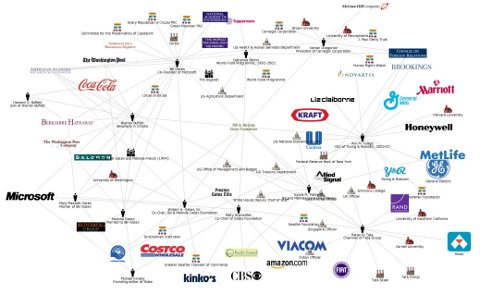12.27.11
Links 27/12/2011: Linux 3.2 RC 7, GNOME 3.3.3
![]()
Contents
GNU/Linux
-
Kernel Space
-
Linux Kernel 3.2 RC7 Is Available for Testing
Linus Torvalds announced last night, December 23rd, that (probably) the last Release Candidate version of the upcoming Linux kernel 3.2 is available for download and testing.
-
Linux 3.2-rc7: A Present From Linus Torvalds
-
POHMELFS: A New But Old Distributed Linux File-System
In a Christmas-themed announcement, Evgeniy Polyakov has unveiled a brand new POHMELFS distributed file-system implementation for the Linux kernel.
POHMELFS is new in terms of being an old but completely re-designed distributed file-system. The new POHMELFS serves as a POSIX front-end to the Elliptics network, which has already been used in production cases for multiple years and handled billions of objects to one petabyte in storage.
-
AMD A8-3870K – Radeon HD 6550D Graphics
-
Graphics Stack
-
The X.Org Stack For Ubuntu 12.04 To Enter Staging
Canonical is preparing to push their X.Org Server configuration they intend to use in Ubuntu 12.04 LTS “Precise Pangolin” into their staging area. Once again, it’s not the latest upstream code, but a convoluted solution.
-
X.Org Server GPU Hot-Plugging Moves Along
David Airlie has achieved a bit more success in his GPU “PRIME” work to provide graphics processor hot-plugging support under Linux with the X.Org Server.
-
Semaphores Continue Biting Intel Linux Users
It turns out the semaphore issues for Intel Sandy Bridge Linux users continues to be present and it’s resulting in the patch from the recent Intel merge having to be changed at the last minute within the Linux 3.2 kernel.
-
AMD Radeon HD 7970 Open-Source Linux Update
-
New Mesa Uniform Buffer Object Patches Posted
-
-
-
Applications
-
TeamViewer 7 Beta Available For Linux [Remote Desktop Tool]
TeamViewer is an application for remote control, desktop sharing and file transfer between computers, great for meetings, presentations, support and more. It runs on Windows, Mac OSX, Linux (even though it comes in a .deb or .rpm, it uses Wine which comes bundled with it) as well as Android or iPhone. The application is free for personal use only.
-
jEdit: The Force is Strong with This Programmer’s Editor
-
Instructionals/Technical
-
HOWTO: Get right to X with No Display Manager
-
How To Install RoundCube 0.7 For ISPConfig 3 On Debian Squeeze
-
Looping Through a List
-
use rosettacode.org to learn programming in pike
-
swappiness and drop_caches
-
Enable the Gnome Shell in Fedora 16 and Virtual Box
-
Recover Your Deleted Files In Linux using Scalpel Utility
-
How To Transfer Videos From Ubuntu To Kindle Fire Using Miro
Kindle Fire is a pure Amazon device, where the format support and storage capacity forces user to buy content from Amazon. I in fact like that Kindle Fire supports VP8, the video format open sourced by Google. If you are running Ubuntu or any other version of Linux you can now easily encode and transfer movies to your Kindle Fire using the open source application called Miro.
-
-
Wine
-
Games
-
What Does Linux and Role Playing Games Have in Common?
As a recently revived Game Master/DM going back to my RPG roots in Advanced Dungeons & Dragons, 1st Edition after about a 20 year absence, I find that computer technology has impacted Role Playing Games far beyond being able to play online.
-
Update: five Humble Indie Bundle #3 games added to The Humble Indie Bundle #4
-
Humble Indie Bundle #4 Cracks Two Million Dollars
-
Best Real-Time Strategy Games for Android
-
Wargus – Open-Source Warcraft II On Linux
An update has been released to Wargus, an open-source version of the Warcraft II game that was originally released back in the 90′s.
Pali Rohár has taken over the Wargus project as the open-source version of Blizzard’s Warcraft II. It works under Linux too. However, you do need a copy of the game’s CD for Wargus to work as it relies upon the original game assets. Besides running natively on Windows and Linux, there’s been Wargus ports to the Nokia N900 (Maemo), PocketPC, GP2X, Windows Mobile Phone, and Android, among other platforms.
-
-
-
Desktop Environments
-
Razor-qt: A New Linux Desktop Alternative
Among GNOME 3, Ubuntu Linux’s Unity, and Windows 8′s Metro, there’s no denying that desktop environments have become a hot topic in 2011. More specifically, mobile-inspired interfaces are becoming increasingly commonplace, challenging users to accept a whole new paradigm in the desktop world.
-
K Desktop Environment/KDE SC)
-
Qt 5 For Your Web Applications In The Browser
A Nokia developer shared this week that his Qt 5.0 patch-set for Google Native Client is roughly on par with the Qt4 port, which he hopes to have integrated for upstream development in Qt5. This work allows for the Qt5 tool-kit to be used by web applications within supported web-browsers.
-
Demystifying Krita with Comics
If you’re like most people, getting started with an app like Krita can be intimidating. Working with a graphics tablet takes as much getting used to as learning to draw with ink and paint. How all the settings and tools work together when “used correctly” is a whole other problem. Fortunately, Krita has just released a training DVD that shows novices how it’s done, and helps fund development at the same time.
-
-
GNOME Desktop
-
GNOME 3.3.3 Released Just in Time for Christmas
The GNOME Project announced a few minutes ago, December 23rd, the immediate availability for download and testing of the third development release of the upcoming GNOME 3.4 desktop environment, which brings assorted improvements and bug fixes.
-
Linux Mint’s Cinnamon: A GNOME 3.x shell fork
GNOME 3.2 keeps losing fans so leading Linux desktop distribution Mint turns its attention to forking the GNOME shell into a GNOME 2.x like desktop: Cinnamon.
-
-
-
Distributions
-
Linpus Lite Desktop 1.6 review
Linpus Lite is a Linux distribution published by Linpus Technologies, Inc., a Linux software solutions provider based in Taiwan. Linpus Lite Desktop is, as the name suggests, the version designed for traditional desktop computing. Aside from that, the company also publishes other editions (for example, Linpus Lite Android Edition and Linpus Lite PCTV), but those are for OEMs and ODMs vendors only, and not available for download by the public. (OEM – Original Equipment Manufacturer; ODM – Original Design Manufacturer.)
-
New Releases
-
Clonezilla 1.2.11-40
-
SMS 1.6.3
-
Semplice 2.0.0
-
LITRIX 11-12
-
Grml 2011.12
-
AgiliaLinux 8.0.0: Ooops, We Did It (Again)!
Stop, you could ask, why is this version 8 then? Because AgiliaLinux is not a brand-new distribution. It is based on MOPSLinux, a project which stopped development. The previous version of AgiliaLinux was more or less a remake of MOPS. The current version is a fully independent development.
This version was planned for release ages ago. A member of the development team wrote a comment on my post about AgiliaLinux 7 stating that version 8 was due in June. And finally… in October they did it! -
Tiny Core Linux 4.2 Introduces Tiny Core Plus
Robert Shingledecker proudly announced earlier today, December 27th, the immediate availability for download of the Tiny Core Linux 4.2 and Tiny Core Plus Linux 4.2 operating systems.
-
-
Red Hat Family
-
Weaker Euro to hurt Red Hat Q4 revenue
Business software maker Red Hat Inc forecast fourth-quarter revenue largely below analysts’ expectations hurt mainly by a weaker euro, sending its shares down 7 per cent in after-market trade.
-
Arciero Testifies for Red Hat to Massachusetts Economic Assistance Coordinating Council
State Representative James Arciero recently testified before the Massachusetts Economic Assistance Coordinating Council (MEACC) in support of Red Hat, Inc., a Westford high tech company, in their bid proposal for a tax credit to create new jobs at their Westford office. The MEACC subsequently awarded a state tax credit of $3.4 million.
-
-
Debian Family
-
Derivatives
-
Canonical/Ubuntu
-
Tweak Your Ubuntu Unity Desktop With MyUnity
One of the reasons that many hated the Unity desktop in Ubuntu is because there is a lack of customization option. People switched from Windows/Mac to Linux is mainly because Linux offers them an environment where they can customize everything to their liking. When Canonical reduced your ability to do what you want with your desktop, many people start to grunt about it and some even switched to Linux Mint.
-
Ubuntu Tweak 0.6 released
-
Ubuntu IVI Remix Beta 2 Officially Released
Canonical, through Lars Anderson, announced last evening, December 21st, the immediate availability for download of the Ubuntu In-Vehicle Infotainment (IVI) Remix operating system.
-
Canonical Releases Beefed Up Database API for Ubuntu One
-
CTL launches MB40U Ubuntu notebook
-
Quality In Ubuntu
Over the last year quality has become a strong area of focus inside Canonical. This has included re-factoring the roles and responsibilities of QA staff (focusing them on defect analysis as opposed to just bug triage), Pete Graner has been leading an effort to get an extensive automated testing infrastructure in place, Jason Warner has led an effort to put acceptance criteria in place for Canonical upstreams (this requires that a certain level of quality is assured before Unity updates are landed in the development branch of Ubuntu), and I have hired Nicholas Skaggs who starts in January to build out our QA community, with a particular focus on manual testing and triage.
-
-
-
-
-
Devices/Embedded
-
$25 Linux PC ‘Raspberry Pi’ to Go in Production Early Next Year
Much awaited credit card size $25 computer Raspberry Pi is about to go in production early next year. First run beta devices are currently being tested. If all goes well, you will be able to purchase it in January.
-
Boxee 1.5 for desktops arrives, but the end is nigh
Boxee released version 1.5 of its free multimedia streaming software for Mac, Windows, and Linux desktops today, but simultaneously announced that it will cease offering the Boxee desktop software after January 2012. Thereafter, the company will limit its focus to devices such as the D-Link Boxee Box.
-
Boxee Mac media player reaches end-of-life with new version
The Boxee project has come a long way from its humble origins as a fork of the Xbox Media Center, bringing easy video playback and a couch-to-screen UI to the Mac, then later to Windows and Ubuntu, and now to the company’s own dedicated Boxee Box
-
Boxee 1.5 for desktops arrives, but the end is nigh
Boxee released version 1.5 of its free multimedia streaming software for Mac, Windows, and Linux desktops today, but simultaneously announced that it will cease offering the Boxee desktop software after January 2012. Thereafter, the company will limit its focus to devices such as the D-Link Boxee Box.
-
Boxee updates apps to version 1.5, says no more upgrades for PC users
Boxee rolled out version 1.5 of its Windows, Mac, and Ubuntu apps today, but the news is bittersweet: according to the company, this will be the last time it issues an upgrade for PC. The platform’s future will be on the Boxee Box and the other streaming devices that run Boxee OS, from partners like Iomega and Nuu Media. It’s not a totally surprising move — the upcoming Boxee Live TV won’t be usable with a computer, and Boxee has had some issues getting major partners on board with its PC software anyway — but we’re betting there are plenty of home theater PC fans feeling abandoned on the day after Christmas.
-
Phones
-
Android
-
10 Android apps for holidays
-
7 Best Free Android Home Computer Emulators
-
5 beautiful Android Launchers worth trying out
-
Android Approved By Pentagon For DoD Usage, Major Setback For iPhone
The Pentagon has approved a version of Android running on Dell hardware to be used by DoD officials, along with the BlackBerry. The approval of Android by the DoD is a major setback for Apple’s iPhone.
This doesn’t mean that DoD employees can use any Android phone. The Pentagon has approved only Dell’s hardware running Android 2.2. Interestingly Dell recently discontinued its Streak phone which runs Android 2.2. Dell is now offering Dell Venue which runs on Android 2.2. So, this is the phone which DoD employees can use.
-
Android Is Finally Coming Back to Linux Kernel
Tim Bird in collaboration with many Linaro and individual developers, including Linux kernel maintainer Greg Kroah-Hartman, announced the beginning of the Android Mainlining Project, to include Android’s patches and features into the mainline Linux kernel.
-
Sharp unveils the AQUOS PHONE IS14SH – a 2.3 feature phone for the masses
While Sharp has never had a strong foothold in Europe or the US, the Japanese manufacturer has been the leader in the mobile segment in its own country for many years. Sharp does have a few high-end Android phones like the AQUOS PHONE 102SH which features a 4.5-inch 720p display, 12 megapixel camera, a dual-core 1GHz TI OMAP4430 processor and a waterproof body, but the majority of their sales are comprised of clam-shell or slide-out feature phones.
-
“$100 ICS Tablet” Novo7 is available for pre-order… for $120
More than a few people got excited at the prospect of a $100 Ice Cream Sandwich tablet when a no-name manufacturer sprang out of China marketing the Novo7… and immediately became less excited at a $60 shipping fee that seemed more than a little fishy. Now the same low-powered tablet is sitting pretty with a pre-order status on import sites PandaWill and Merimobiles, both of which seem legitimate enough as far as Internet storefronts go. The latter is claiming an $80 discount off of the “retail” price of $200.
-
Bringing Android/Linux Home in 2012
-
HTC Flyer’s price dropped to £199, sale season starts early
Really wanted a tablet for Christmas but the high prices put you off? Well Dixons online in the UK could well have come to the rescue by dropping the price of the HTC Flyer to £199 for the wifi only version.
-
-
-
Sub-notebooks/Tablets
-
Amazon Kindle Fire Will Burn Your Fingers If You Try To Root
Amazon is a great company when it comes to buying physical stuff — their delivery is great. But when it comes to the digital content Amazon is as freaky as Apple. The company DRMs its books locking users into Amazon ecosystem. It also ‘endorsed’ usage of DRM for Android apps. Now, the company is playing Apple/Sony by wasting its resources in pushing patches to remove roots and ROMs from jail-broken Kindle Fire. Amazon recently pushed an update (6.2.1) for its Kindle Fire which breaks the root on jail-broken devices.
-
Kindle Fire Rooted Again
One lesson that Amazon seems to not learn despite being a heavy Linux user is — don’t waste your time on un-rooting your devices. Let the developed do what they want to do with the devices they ‘bought’. This is a cat and mouse game where in the end the developers will win.
-
Sony Tablet S To Get Android 4.0
Sony has finally given some indications of upgrading their Sony Tablet S to the version 4.0 of Android. Sony has not made any official statement, but a forum moderator did reply to a thread stating that the company is looking into ICS. He also said that there is no commitment at this moment. This language is vague but typical and safer for the thread moderator.
-
-
Free Software/Open Source
-
FLOSS for Science Books November 2011
-
Two decades of Linux: the big open source stories of 2011
In 1999, Linux founder Linus Torvalds joked about plans for world domination. But as the Linux kernel celebrated its 20th birthday this year, Linux, and open source in general, have achieved a limited version of world domination. As we reported in August, Linux in its many forms now powers a majority of the world’s supercomputers. Apache web servers running on Linux and other Unix operating systems serve up the majority of the web sites on the Internet, and Linux powers some of the biggest sites on Earth—including Facebook, Google and Wikipedia. And embedded versions of Linux are part of the explosion of network-connected consumer devices, most notably as the basis of Google’s Android mobile OS.
-
Encouraging the next generation of hackers part 2 – Software implementation
-
Open*Business: 2011 in review
-
Open*Business 2011 best images
The visual components on opensource.com are an important element to the look and feel of our content. The images help set the tone for the site. The imagery embodies qualities such as motivational, editorial, authoritative (but not authoritarian), human, and optimism.
-
Web Browsers
-
Mozilla
-
Download Firefox 10.0 Beta 1 and Firefox 9.0.1 for Linux
A day after the release of Mozilla Firefox 9.0.1 security fix, Mozilla unleashed today, December 23rd, the first Beta version of the upcoming Mozilla Firefox 10.0 web browser for Linux operating systems, and other supported platforms.
-
-
-
Oracle/Java/LibreOffice
-
LibreOffice seeks bug hunters
The Document Foundation has announced its first bug hunting session for version 3.5 of the open source LibreOffice office suite – to be held online on 28 and 29 December. On those days, the Quality Assurance (QA) team and some experienced developers will be available on the IRC channel #libreoffice (IRC link) from 8am to 10pm UTC and will accept bug reports not only via Bugzilla, usually the only option, but also by chat and email.
-
USPTO Rejects Another Oracle Patent, Google Looks Stronger
USPTO has presented Google with a last minute Christmas gift by rejecting Oracle’s U.S. Patent No. 6,192,476. According to Groklaw, on December 20 the USPTO issued a final rejection in the ex parte reexamination. All of the claims of the patent were subject to reexamination, including Claim 14. Claim 14 of the patent was the only claim being asserted by Oracle in this litigation, writes Groklaw. This rejection means Oracle has already lost 17 out of 21 patents, including all seven of the patent’s independent claims.
-
-
Healthcare
-
When Medicare Isn’t Medicare
Let’s say you have a Ford and decide to replace everything under the hood with Hyundai parts, including the engine and transmission. Could you still honestly market your car as a Ford?
That question gets at the heart of the controversy over who is being more forthright about GOP Rep. Paul Ryan’s plan to “save” Medicare, Republicans or Democrats.
-
-
Project Releases
-
Programming
-
LLVM 3.1 Will Enhance AVX & Bring AVX2 Support
While LLVM 3.0 has been barely out for one month and a release schedule for LLVM 3.1 hasn’t even been plotted yet, there are already some new details about what this next release of the extremely popular open-source compiler infrastructure will offer.
In particular, LLVM 3.1 is poised to offer bug-fixes and overall improved support for Advanced Vector Extensions. AVX is the x86 instruction set extension that first appeared with Intel Sandy Bridge processors in early 2011 and then made their way to the AMD side with the Bulldozer launch.
-
Leftovers
-
Security
-
Environment/Energy/Wildlife
-
Under the Surface of Non-OPEC Supply
In 2002 Non-OPEC oil production contributed 60.75% of the world’s total oil supply. But technology, competition, and access to capital through listings on stock exchanges have not been able to overcome limits of geology. Global giants such as Royal Dutch Shell and Exxon Mobil have essentially abandoned the effort to meaningfully expand their oil reserves. Instead, they are now shifting course in favor of a strong, natural gas emphasis. The result is that Russia in the past decade has accounted for nearly all of the supply growth in crude oil, among Non-OPEC producers. Indeed, without Russia, Non-OPEC supply would be in steep decline. Instead, it’s merely flat.
-
-
Finance
-
’2012: What’s in Store…’
The Private Global Power Elite embedded in major governments is dead set on imposing World Government on us sooner rather than later. Let’s look at 12 mega-processes – veritable “Triggers” – that we infer they are using to achieve their goals.
All roads lead to World Government. This should come as no surprise. London’s Financial Times openly articulated this view in an article by their chief foreign affairs commentator, Gideon Rachman, published on 8 December 2009, whose title said it all: “And Now for a World Government.” These goals are echoed by the Trilateral Commission, CFR and Bilderberg insiders – even by the Vatican.
Macro-managing planet Earth is no easy matter. It requires strategic and tactical planning by a vast think-tank network allied to major elite universities whereby armies of academics, operators, lobbyists, media players and government officers interface, all abundantly financed by the global corporate and banking superstructure.
-
Argentina tango lessons: Europe’s turn for financial danse macabre?
Exactly ten years ago Argentina suffered a full-scale financial and governmental collapse. That was the end-result of over a decade of doing exactly what the IMF, international bankers, rating agencies and global “experts” told us to do.
Then President Fernando de la Rúa kept applying all IMF recipes to the very last minute, making us swallow their poisonous “remedies”.
-
-
PR/AstroTurf/Lobbying
-
Jack Abramoff Explains The Return On Investment For Lobbying: 22,000% Is Surprisingly Low
We’ve talked a lot about the political process and how things work in DC to get things like SOPA pretty far along, even as the public seems to be almost universally against it. As you hopefully know by now, Larry Lessig has been focusing his attention on the issue of the deep-seeded corruption in the way our government works today, and his recent book, Republic, Lost focuses deeply on the issue. A few weeks back, Lessig did a fantastic interview on the subject with the Boston Review. In it, he describes how Congress picks up on unpopular legislation for the sake of scaring people (on all sides) into donating to their campaigns…
-
-
Civil Rights
-
Analyzing Carrier IQ Profiles
As we explained in our post on Carrier IQ’s architecture, one of the main factors in determining what the Carrier IQ stack does on a particular phone is the “Profile” that is running on that device. Profiles are files that are typically written by Carrier IQ Inc. to the specifications of a phone company or other client, and pushed to the phone by Carrier IQ Inc. using its own command and control infrastructure. Profiles contain instructions about what data to collect, how to aggregate it, and where to send it.
-
Obama Gave Manning “Verdict First, Trial Later.”
-
Why Stop Billions When You Can Stop Millions….?
You will receive the same thing I received…a form letter mechanically stating the reasons to support SOPA. Jobs, yada, yada, yada. Protecting American IP, yada, yada, yada….it takes a staffer about 30 seconds to scan your email and hit send on thier boiler-plate response.
You and your “opinion” are forgotten in less than a minute.
Get that person on the phone and raise hell. Remind said staffer that the congressman from X state is going to lose his job over support of this bill. Don’t let them lapse into talking points. Sure you are going to spend some time on hold but outside of a personal appearance, your phone call is the most effective way of getting your message across.
Regardless of what happens to Lamar Smith personally or professionally, he will forever be known as The Man That Broke The Internet.
-























 Content is available under CC-BY-SA
Content is available under CC-BY-SA